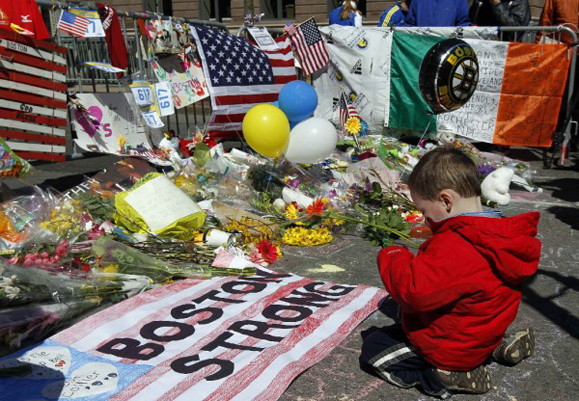The First Word, by Patricia Harty.
Our hearts weep for Boston.
This most Irish of American cities has seen its share of tragedy, but when the bombings at the marathon turned a sporting celebration into a scene of destruction, it was a fresh horror that is hard to process.
This city, where at least a quarter of the population are of Irish heritage, is one of the cornerstones of our history in America.
When the news of the blasts hit, all that history came flooding back. Knowing the measure of the city’s hardscrabble past gave reassurance that Bostonians would rise above this tragedy, because that’s what they have always done.
It was to Boston that thousands of Irish at the edge of desperation would find their way during the Famine years. They crowded into the waterfront close to the docks where the men might find a day’s work and the women might find jobs as domestics. The unsanitary conditions were breeding grounds for disease. *Sixty percent of children did not reach their sixth birthday, and on average, the adult Irish immigrant lived just six years after arrival. (Patrick Kennedy, great-grandfather of JFK, was one of those adults who did not survive. He died of cholera, which had earlier taken his first-born son, John III, at just 18 months.) And still they clung on, and enough survived and eventually thrived. “Out of those narrow lanes, blind courts, dirty streets, damp cellars, and suffocating garrets will come forth some of the the noblest sons of our country, whom she will delight to own and honor,” wrote Orestes Brownson in the Quarterly Review in 1843.
Boston gave us two of her finest sons, and they too were taken from us. First John in 1963 and then Bobby in 1968. They would weep for their beloved Boston today. But we can hear JFK’s strong voice saying, “We have come too far, we have sacrificed too much, to disdain the future now.”
And indeed, the people of Boston inspired the nation as we witnessed ordinary citizens turn into heroes, and the emergency services and police operating at their highest levels. In the days following the bombings the community rallied to help families affected by the tragedy. A “Dance Out for Jane” was held for the Richard family of Dorchester. Eight-year-old Martin Richard was killed in the blast. Jane, his seven-year-old sister, lost her leg, and their mother, Denise, suffered a head injury. Jane was an Irish step dancer at the Clifton Academy of Irish Dance in Milton.
When tragedy strikes, it is often to the artists that we turn to raise our spirits and funds. Two New Yorkers, David Fagin and Jaime Hazan, wrote a song called “Boston Strong” that got a lot of play on YouTube. Hazan was a 9/11 first responder during the attacks on the World Trade Center.
In the wake of 9/11,“Amazing Grace” was the tune we heard most often at memorial services for the fallen. Judy Collins plucked this 18th-century hymn from near obscurity in the late sixties, and it has never really left our cultural consciousness since. Judy, who also composed her own anthem for 9/11 first responders called “Kingdom Come,” still believes in the power of music to heal. And I do too.
Mortas Cine.


Leave a Reply